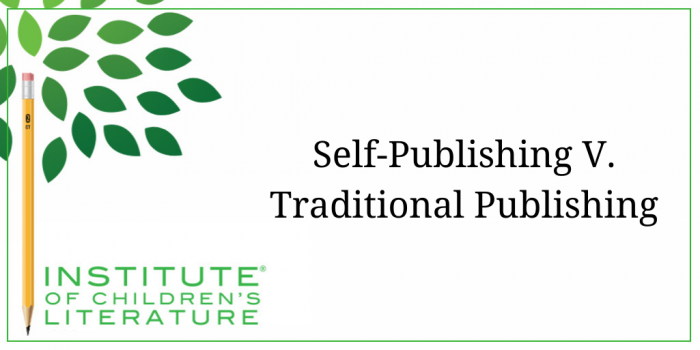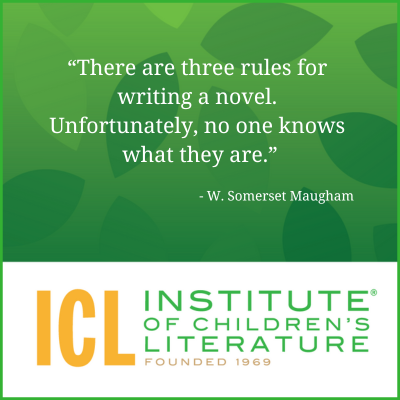1000 N. West Street #1200, Wilmington, DE 19801
© 2024 Direct Learning Systems, Inc. All rights reserved.
Beginning Tuesday, July 22, 2025 at 10 PM CT through Wednesday, July 23, 2025 at 4 AM CT, we will be performing scheduled maintenance to update our website.

If you read a lot of information about writing: essays like this one, discussions like the ones on the Institute’s Facebook pages and in either of our groups, writing books, writer’s magazines, you’ll eventually realize that sometimes you’ll see two professional, successful writers who give advice that completely conflicts.

I’ve also listened to keynote speakers at different writer’s events. I heard one wonderful, compelling young adult author who said that writers absolutely need to write from their darkest, most painful places. That compelling story comes from compelling pain and experience. On the other hand, I know another writer making a decent living at book writing who had no interest in bleeding on the page at all—she just wants to take the reader on a lively, funny adventure. So which one of these two people is the true writer? The answer: both.
I’ve heard writers say that writing without substantial prewriting (planning, research, outlining) is just asking for a book that fizzles out before you reach the end. And I’ve heard writers say that you should never outline as it kills your creativity and closes you off to serendipity. You should, such a writer says, just sit down, open up your imagination, and begin writing. So which of these writers is right? The answer: both.
There are so many ways to access your creativity, write compelling work, and publish well. The reason you find so much conflicting advice is because there are so many good, solid, valid ways to do what we do. Get an agent? Could be a good idea. Get a few books published before you worry about needing an agent? Could be a good idea. Self-publish? Find a publisher? Outline? Write by the seat of your pants? Join a critique group? Work with on trusted critique partner? They’re all different footpaths that end at the exact same spot as long as you’re on the path that works for you.

There’s a reason why most writers say they spent about ten years getting ready for their first book to be published. For most of us, that’s about how long it took to hone our craft (because learning to write well is a process, no matter which other choices you make) and then sort through all the choices to find the ones that work well for us specifically. I’ve written books to very specific outlines. I’ve written books by sitting down and working out the plot as I go. I find that (for me) the longer the book, the harder it is to maintain a good story without the bones of an outline. But I found that out by trying things. And what I found out is true for me, but doesn’t have to be true for everyone.
You can learn a lot by reading published books and letting the structure and skill of that author ooze into your brain as you read. You can learn still more by working with a good writers group or critique group where everyone lifts one another and grows together. You can learn through classes, workshops, or lectures. But ultimately, you’ll learn the most by trying stuff. When you listen to a good writing podcast, it’s just noise in your ear unless you try the stuff you hear. When you buy a writing book, it can help you wile away some pleasant hours, but it’ll only make you a better writer if you try some stuff from it. You learn to write by writing.
Now, when it comes to things like self-publish vs. established trade publishing vs. tiny press publishing vs. educational publishing, the choices get a little harder. It’s not really a good idea to simply “try” things until you have a firm understanding of:

So don’t believe all the different voices trying to insist that there is only one way to be published. Most of those voices mean well, but whenever anyone tells you that there is only one way, they’re likely to be wrong. Research carefully. Always ask questions. And don’t let eagerness run you into trouble, and you’ll soon find the publishing path that works for you and your work. It won’t be the same path as someone else, and that’s fine. No matter what you choose, someone has chosen something totally different and ended up feeling successful and content. But odds are someone has chosen the same way as you and ended up feeling successful and content as well.
You don’t need to find the path that works for everyone.
You just need the right one for you.
Go get ’em, tiger!
With over 100 books in publication, Jan Fields writes both chapter books for children and mystery novels for adults. She’s also known for a variety of experiences teaching writing, from one session SCBWI events to lengthier Highlights Foundation workshops to these blog posts for the Institute of Children’s Literature. As a former ICL instructor, Jan enjoys equipping writers for success in whatever way she can.
1000 N. West Street #1200, Wilmington, DE 19801
© 2024 Direct Learning Systems, Inc. All rights reserved.
1000 N. West Street #1200, Wilmington, DE 19801
© 2024 Direct Learning Systems, Inc. All rights reserved.
1000 N. West Street #1200, Wilmington, DE 19801
© 2024 Direct Learning Systems, Inc. All rights reserved.
1000 N. West Street #1200, Wilmington, DE 19801
© 2025 Direct Learning Systems, Inc. All rights reserved.
1000 N. West Street #1200, Wilmington, DE 19801
©2025 Direct Learning Systems, Inc. All rights reserved. Privacy Policy.
1 Comment